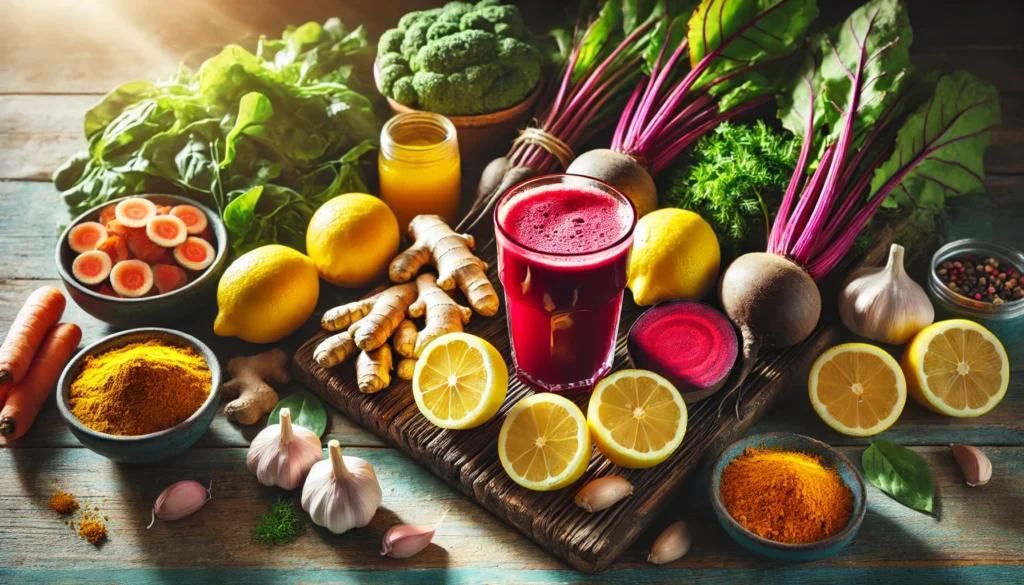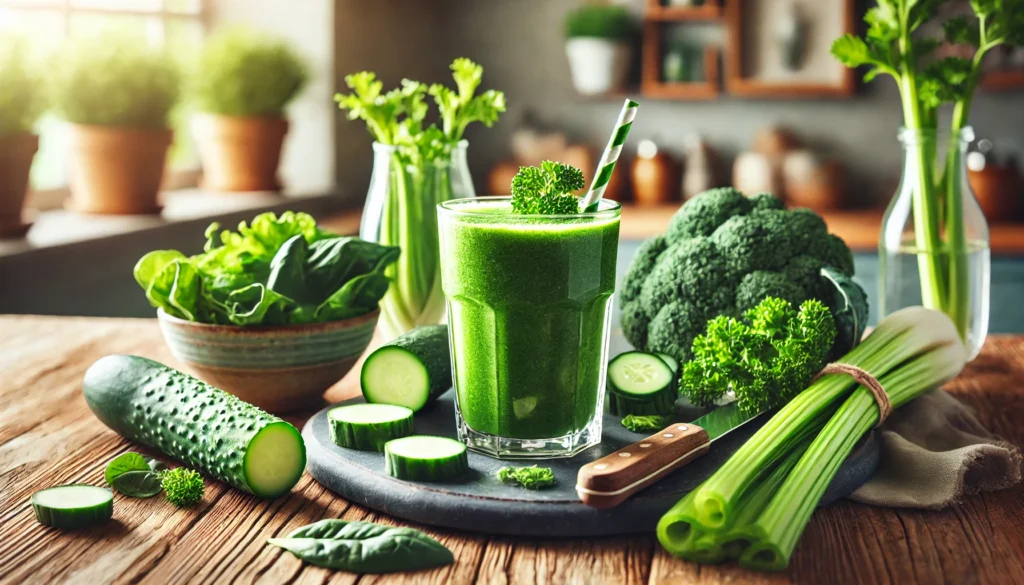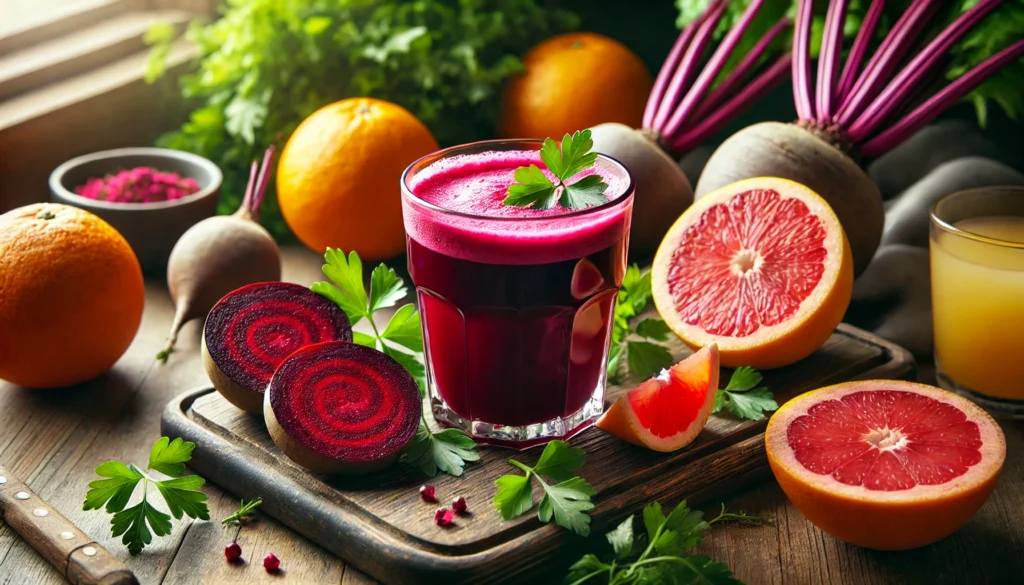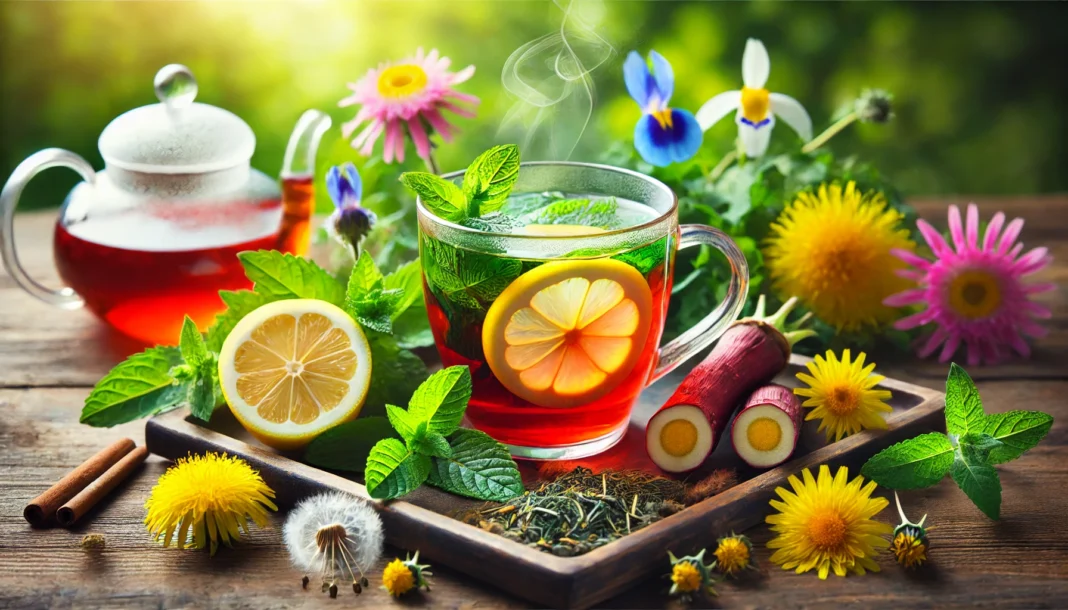The liver is an essential organ responsible for metabolizing nutrients, filtering toxins, and maintaining overall homeostasis within the body. Given its pivotal role in detoxification, supporting liver health through natural dietary interventions is a widely recognized approach to promoting wellness. While the liver is self-sufficient in its detoxifying abilities, certain foods, herbs, and drinks may help optimize its function. This article explores the best natural liver cleanse recipes, delving into the science behind their efficacy and providing actionable strategies for incorporating them into daily life.
You may also like: The Best Liver Detox Supplements: How to Choose Safe and Effective Support for Your Liver
Understanding Liver Detoxification
The liver’s detoxification process involves two primary phases: Phase I and Phase II detoxification. Phase I entails the conversion of fat-soluble toxins into intermediate compounds through enzymatic reactions. In Phase II, these intermediates are further processed into water-soluble compounds, making excretion via urine or bile possible. Nutrient-dense foods rich in antioxidants, vitamins, and specific phytochemicals support these pathways and enhance the body’s natural detoxification mechanisms.
For those seeking a natural liver cleanse, consuming foods that bolster liver function while reducing exposure to processed foods, alcohol, and excessive sugars can be beneficial. Emphasizing whole, plant-based ingredients provides the liver with the necessary compounds to process and eliminate toxins efficiently. The following natural liver cleanse recipes leverage these principles to offer scientifically-backed support for optimal liver health.

Lemon and Turmeric Detox Tea
Lemon and turmeric are both known for their potent anti-inflammatory and detoxifying properties. Lemon provides vitamin C, an antioxidant that supports glutathione production, a key molecule involved in detoxification. Turmeric contains curcumin, which has been shown to enhance liver function and promote bile flow, aiding digestion and toxin elimination.
To prepare this detox tea, combine freshly squeezed lemon juice, a teaspoon of ground turmeric, and warm water. Adding a dash of black pepper enhances curcumin absorption, increasing its bioavailability. Drinking this tea in the morning can stimulate digestion, encourage bile production, and support overall liver health.
Beet and Carrot Liver Cleansing Juice
Beets and carrots are powerful allies for liver detoxification, providing an array of phytonutrients that enhance enzymatic activity. Beets are rich in betalains, which exhibit anti-inflammatory and antioxidant effects, while carrots contain beta-carotene, a precursor to vitamin A that aids in reducing oxidative stress.
A simple yet effective beet and carrot juice recipe involves blending fresh beets, carrots, and a small apple for natural sweetness. Adding a piece of ginger can provide additional digestive support. Consuming this juice regularly can help stimulate bile production and enhance the body’s ability to process toxins.
Garlic and Ginger Liver Detox Shot
Garlic and ginger are revered for their hepatoprotective properties. Garlic contains allicin, a sulfur compound known for its ability to stimulate liver enzymes that assist in detoxification. Ginger has been shown to reduce inflammation and support digestion, making it an excellent addition to a liver cleanse regimen.
To create a concentrated liver detox shot, blend fresh garlic cloves, ginger root, and a splash of lemon juice with water. This potent elixir should be consumed in small amounts, as its strong flavor and effects can be quite intense. Regular consumption can aid in promoting optimal liver function and reducing toxin accumulation.
Green Smoothie for Liver Support
Green leafy vegetables are among the most beneficial foods for liver health, as they contain chlorophyll, fiber, and a host of essential nutrients that aid in detoxification. A green smoothie made with spinach, kale, celery, cucumber, and avocado provides an excellent source of liver-supportive compounds.
Blending these ingredients with coconut water and a squeeze of lime creates a refreshing, nutrient-dense drink. Including flaxseeds or chia seeds can add additional fiber, supporting the elimination of toxins through digestion. This smoothie serves as a nourishing way to enhance liver function while providing sustained energy throughout the day.
Dandelion Root Liver Cleanse Tea
Dandelion root has long been utilized in traditional medicine for its liver-protective and diuretic properties. It stimulates bile production, which aids in digestion and toxin removal. The presence of antioxidants such as flavonoids and polyphenols further supports liver health by reducing oxidative stress.
To prepare dandelion root tea, steep dried dandelion root in hot water for several minutes. The tea can be consumed daily as part of a liver cleanse routine. Adding a teaspoon of raw honey or a slice of lemon can enhance its flavor while providing additional detoxifying benefits.
Cruciferous Vegetable Liver Detox Salad
Cruciferous vegetables such as broccoli, Brussels sprouts, and cabbage contain glucosinolates, compounds that facilitate Phase II liver detoxification. These vegetables also provide fiber, which supports digestion and the removal of toxins from the body.
A liver-detoxifying salad can be prepared by combining chopped broccoli, shredded Brussels sprouts, red cabbage, and arugula. A dressing made from olive oil, apple cider vinegar, Dijon mustard, and lemon juice complements the nutrient profile of this dish. Regular consumption of cruciferous vegetables can enhance the liver’s detoxification capabilities and contribute to overall well-being.
Hydration and Liver Function
Staying adequately hydrated is fundamental to supporting liver health, as water plays a crucial role in flushing toxins out of the body. Infused water recipes featuring ingredients like cucumber, mint, and lemon can enhance hydration while providing additional detoxifying benefits.
A simple detox water recipe includes sliced cucumber, fresh mint leaves, and lemon wedges infused in a pitcher of water. Allowing the ingredients to steep overnight maximizes the extraction of beneficial compounds. Drinking detox water throughout the day can aid in maintaining optimal liver function and promoting overall health.

Frequently Asked Questions (FAQ) About Liver Cleanse Recipes
1. What are the key benefits of using natural liver cleanse recipes?
Natural liver cleanse recipes provide essential nutrients that support liver function and overall health. These recipes often include ingredients rich in antioxidants, such as turmeric, ginger, and leafy greens, which help reduce oxidative stress in the liver. Additionally, consuming a variety of fruits and vegetables in a natural liver cleanse recipe can aid digestion and promote bile production, which is crucial for breaking down fats and eliminating toxins. Hydrating ingredients like lemon and cucumber also contribute to proper liver detoxification by flushing out harmful substances. Regularly incorporating these recipes into your diet can improve energy levels, support metabolic function, and enhance overall wellness.
2. How often should I follow a liver cleanse recipe for optimal health?
The frequency of consuming liver cleanse recipes depends on individual health goals and lifestyle. Some people benefit from including natural liver cleanse recipes in their daily diet by drinking detoxifying beverages or eating liver-friendly meals. Others may prefer periodic detoxification programs lasting a few days to a week, focusing on nutrient-dense smoothies, soups, and teas. It’s important to listen to your body and consult a healthcare professional if you have underlying health conditions before starting a liver cleanse. Incorporating a balanced diet with plenty of fiber, hydration, and lean proteins can maintain liver health without the need for extreme detox protocols.
3. What ingredients should I avoid when making liver cleanse recipes?
While liver cleanse recipes emphasize natural and wholesome ingredients, there are certain foods and additives that should be avoided. Processed sugars, artificial sweeteners, and high-fructose corn syrup can burden the liver by increasing fat accumulation. Excessive sodium, often found in processed foods and canned goods, can contribute to water retention and hinder detoxification. Trans fats, commonly present in fried and processed foods, may increase liver inflammation and contribute to fatty liver disease. Alcohol consumption should also be minimized, as it places significant strain on the liver. Choosing organic and pesticide-free ingredients when possible ensures that your natural liver cleanse recipe is free from harmful chemicals that can compromise liver function.
4. Can a liver cleanse recipe help with weight loss?
Liver cleanse recipes can indirectly support weight loss by promoting efficient digestion and metabolism. A well-functioning liver plays a critical role in breaking down fats and processing nutrients effectively. Natural liver cleanse recipes, particularly those rich in fiber, antioxidants, and healthy fats, can enhance satiety and reduce cravings for unhealthy foods. Hydration from detoxifying beverages, such as lemon water or herbal teas, can also aid in flushing out toxins and reducing bloating. However, sustainable weight loss requires a comprehensive approach, including balanced nutrition, regular exercise, and proper hydration, rather than relying solely on liver cleanse recipes.
5. Are there any risks associated with following a natural liver cleanse recipe?
While liver cleanse recipes are generally safe and beneficial, certain risks exist, especially if detoxification is taken to an extreme. Overconsumption of certain detox ingredients, such as excessive lemon juice or apple cider vinegar, may lead to digestive discomfort or acid reflux. Very low-calorie detox diets can result in nutrient deficiencies and fatigue. Individuals with liver disease, gallbladder issues, or pre-existing medical conditions should consult a healthcare provider before making significant dietary changes. A well-balanced approach that incorporates natural liver cleanse recipes in moderation while maintaining overall nutritional diversity is the safest way to support liver health.
6. Can liver cleanse recipes improve skin health?
Yes, incorporating natural liver cleanse recipes into your diet can contribute to clearer and healthier skin. The liver plays a vital role in detoxifying the body, and when it functions optimally, it helps eliminate toxins that might otherwise manifest as skin issues, such as acne, dullness, or inflammation. Ingredients like turmeric, leafy greens, and citrus fruits in liver cleanse recipes provide antioxidants and vitamins that promote collagen production and reduce oxidative stress. Hydration is another key factor—drinking detoxifying herbal teas or lemon-infused water helps flush out impurities, keeping the skin hydrated and radiant.
7. Are there specific liver cleanse recipes that support digestion?
Yes, many liver cleanse recipes incorporate ingredients that enhance digestion and gut health. Ginger and fennel aid in reducing bloating and supporting the breakdown of food. Fiber-rich ingredients such as chia seeds, flaxseeds, and leafy greens promote regular bowel movements, helping eliminate toxins from the digestive tract. Fermented foods like sauerkraut or kimchi, which contain probiotics, support a healthy gut microbiome and indirectly benefit liver function. Herbal teas, including dandelion root or milk thistle tea, can further support bile production, improving digestion and nutrient absorption.
8. Can a liver cleanse recipe help reduce inflammation?
Yes, many liver cleanse recipes include anti-inflammatory ingredients that support liver health and reduce overall inflammation in the body. Turmeric, known for its curcumin content, is one of the most effective natural anti-inflammatory agents. Ginger, green tea, and berries are also commonly found in natural liver cleanse recipes due to their ability to neutralize free radicals and reduce oxidative stress. Reducing inflammatory foods, such as refined carbohydrates and processed meats, while consuming a diet rich in whole foods and liver-supporting herbs, can significantly improve liver function and reduce inflammation-related conditions.
9. What is the best time of day to consume a liver cleanse recipe?
The best time to consume a liver cleanse recipe depends on the ingredients used and individual preferences. Many people start their day with a detoxifying drink, such as warm lemon water or a green smoothie, to kickstart digestion and hydration. Others prefer consuming a liver-friendly meal at lunch or dinner, incorporating cruciferous vegetables, healthy fats, and lean proteins. Herbal teas like milk thistle or dandelion root can be consumed before bed to support overnight detoxification. Consistency is key—whether you choose morning or evening, regularly integrating liver-supporting foods can enhance long-term liver health.
10. Can children or pregnant women safely consume liver cleanse recipes?
While many natural liver cleanse recipes contain healthy, nutrient-rich ingredients, not all are suitable for children or pregnant women. Some detoxifying herbs, such as milk thistle or dandelion root, may not be recommended during pregnancy due to their potential effects on hormone levels. Similarly, highly acidic drinks or excessive amounts of raw cruciferous vegetables may cause digestive discomfort in children. It is best to focus on gentle, whole-food-based liver cleanse recipes that emphasize hydration, fiber, and essential vitamins without extreme detoxification components. Always consult a healthcare professional before introducing any dietary changes, especially for pregnant women and young children.

Final Thoughts on Natural Liver Cleansing
While the liver is highly capable of detoxifying itself, providing it with supportive foods and beverages can enhance its efficiency. Incorporating natural liver cleanse recipes into a balanced diet ensures that the liver receives the nutrients it needs to function optimally. Maintaining a healthy lifestyle by reducing exposure to processed foods, alcohol, and environmental toxins further contributes to overall liver wellness.
By integrating these recipes into a daily routine, individuals can take proactive steps toward improving liver health and supporting long-term detoxification. As always, it is advisable to consult with a healthcare provider before making significant dietary changes, particularly for individuals with preexisting liver conditions. A well-nourished liver is essential for overall vitality, and prioritizing its health can lead to lasting benefits for the entire body.
detox drinks for liver, liver-friendly foods, natural detox methods, herbal liver support, healthy detox smoothies, liver health nutrition, holistic detoxification, liver support supplements, cleansing teas for liver, bile production enhancement, turmeric for liver health, beets for detox, green smoothie benefits, cruciferous vegetables detox, hydration and liver function, dandelion root benefits, garlic and liver health, ginger for detoxification, antioxidant-rich foods, liver wellness tips
Further Reading:
10+ Home Remedies to Naturally Detox Liver
11 Foods That Are Good for Your Liver
Liver Cleanse: How To Detox Your Liver Naturally With Foods
Disclaimer
The information contained in this article is provided for general informational purposes only and is not intended to serve as medical, legal, or professional advice. While NewsHealthWatch strives to present accurate, up-to-date, and reliable content, no warranty or guarantee, expressed or implied, is made regarding the completeness, accuracy, or adequacy of the information provided. Readers are strongly advised to seek the guidance of a qualified healthcare provider or other relevant professionals before acting on any information contained in this article. NewsHealthWatch, its authors, editors, and contributors expressly disclaim any liability for any damages, losses, or consequences arising directly or indirectly from the use, interpretation, or reliance on any information presented herein. The views and opinions expressed in this article are those of the author(s) and do not necessarily reflect the official policies or positions of NewsHealthWatch

